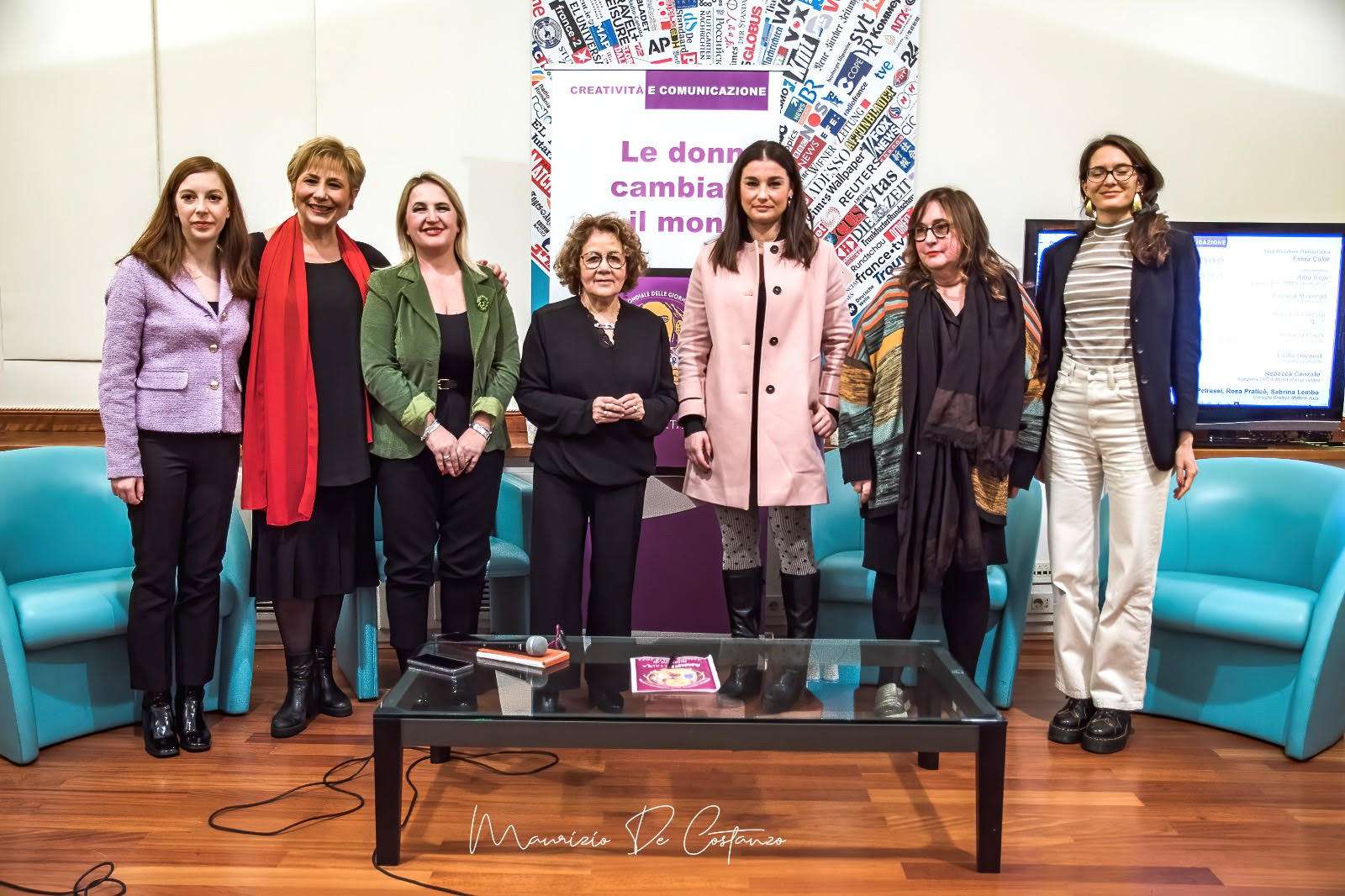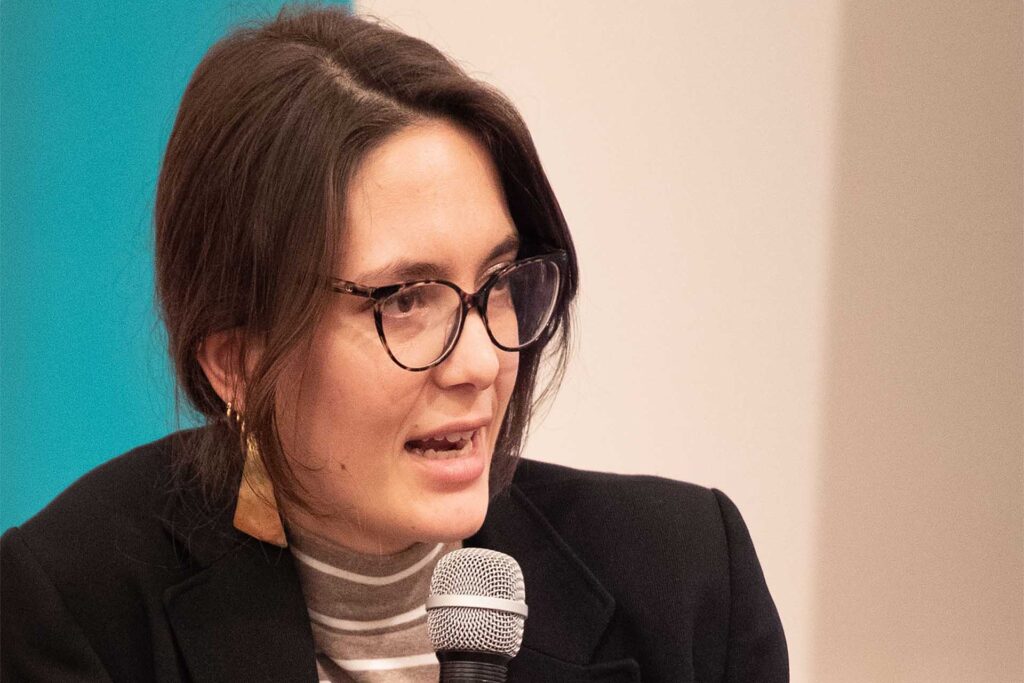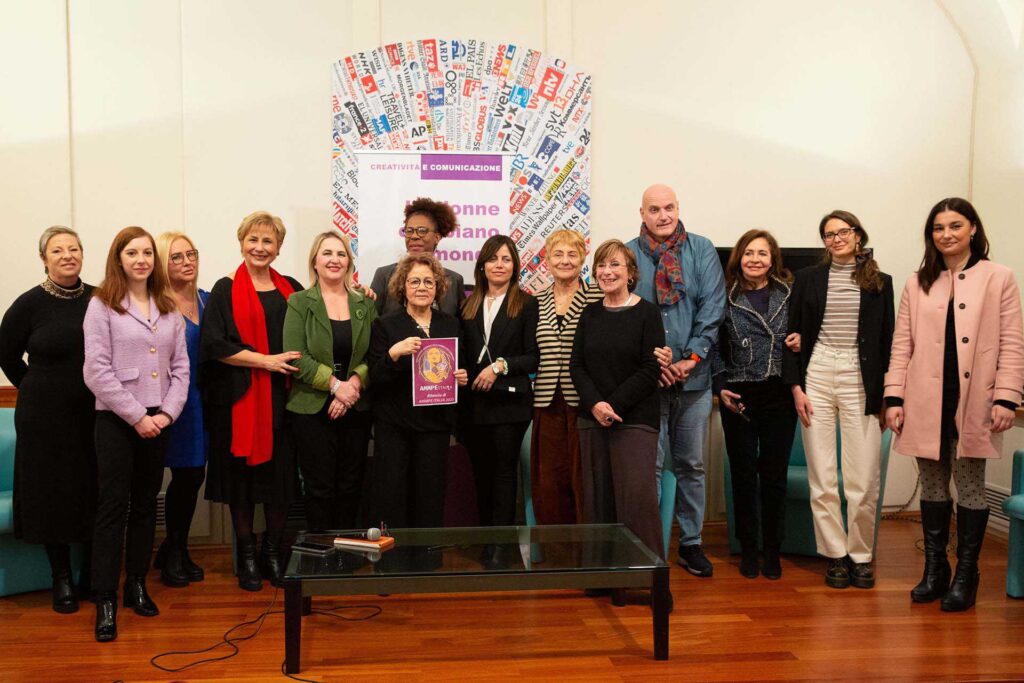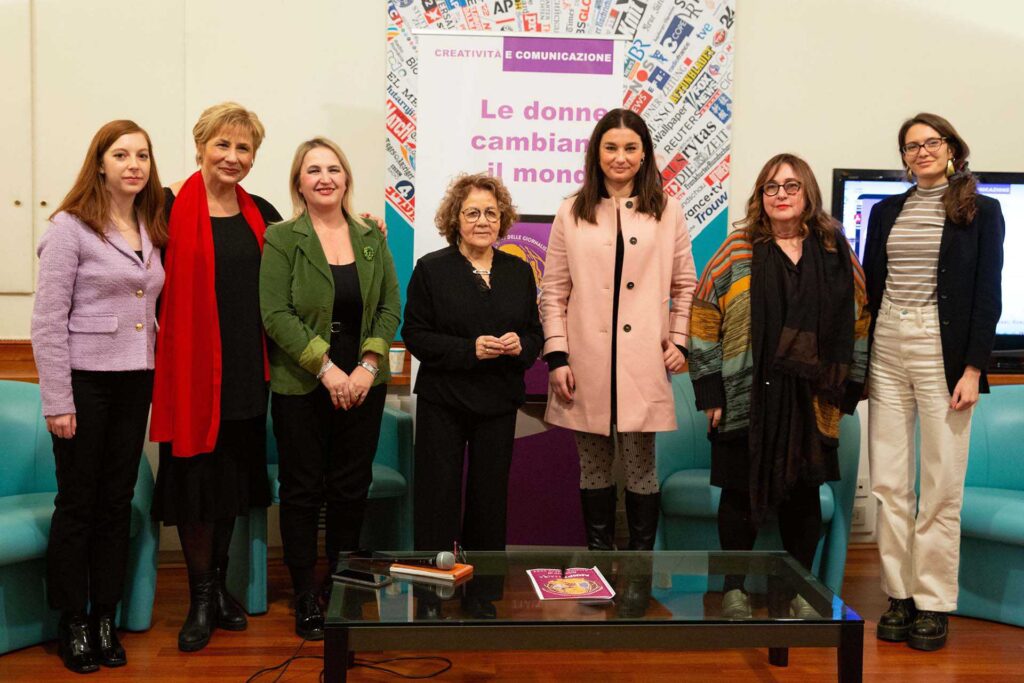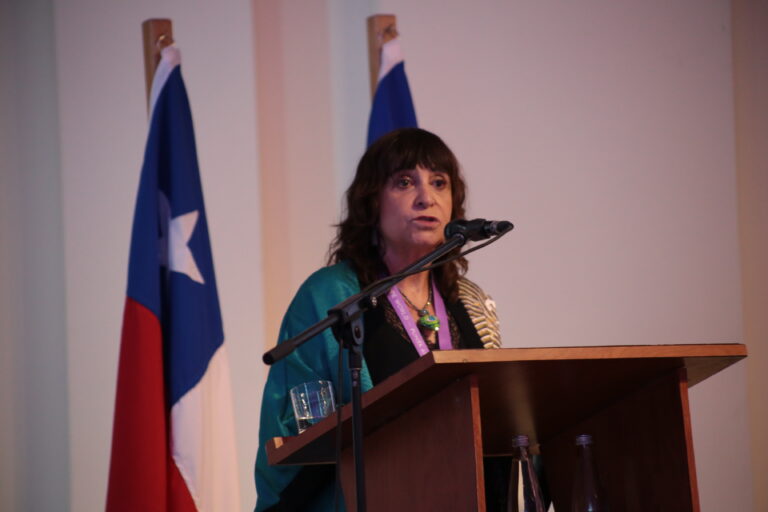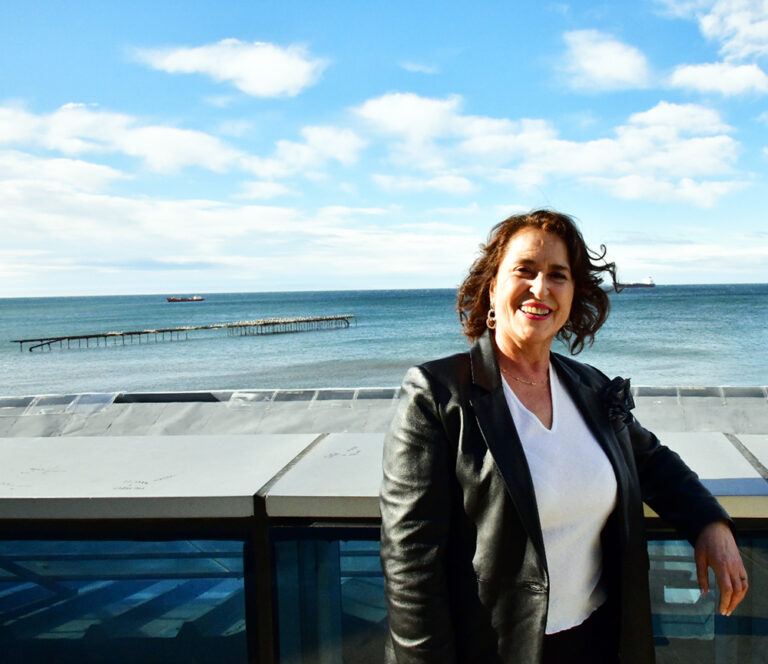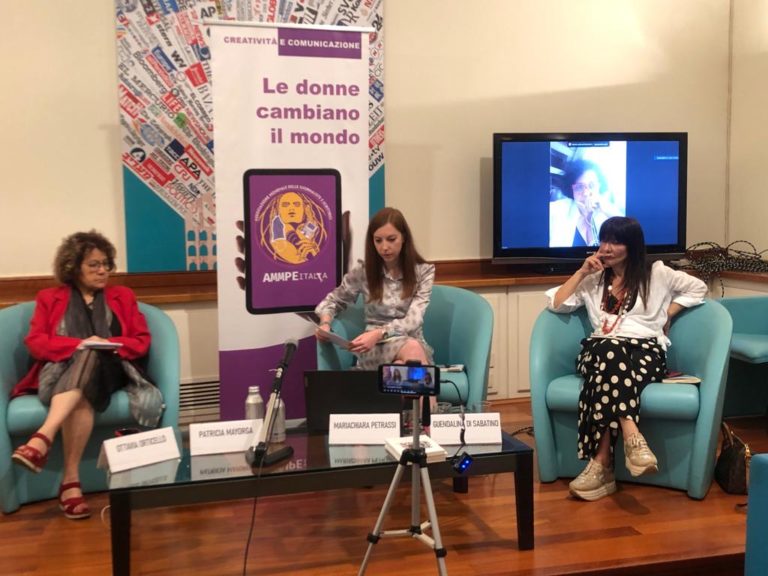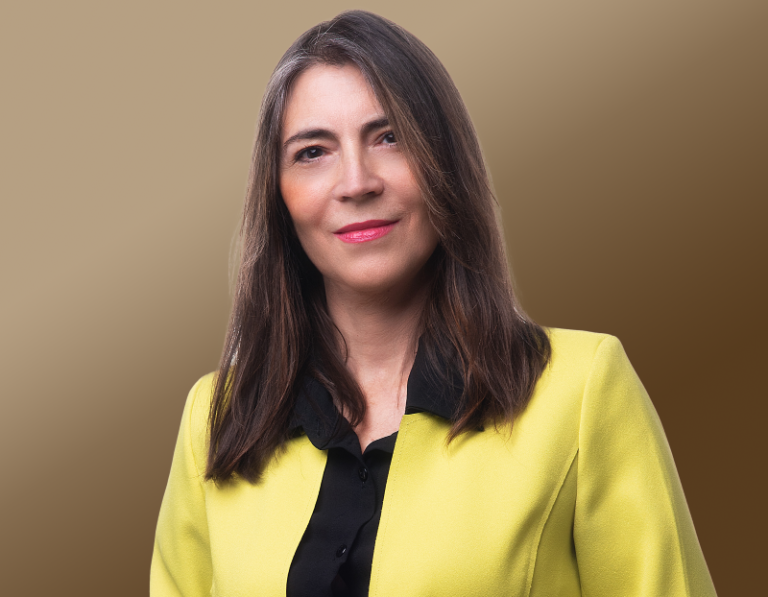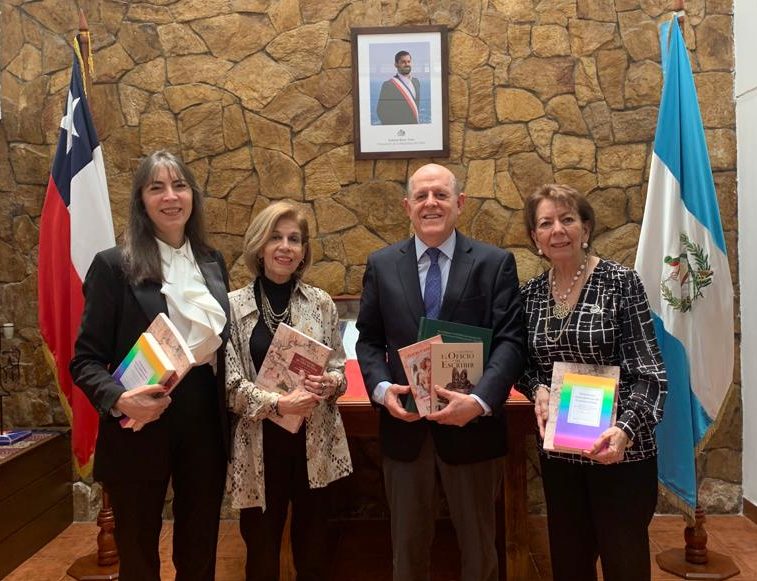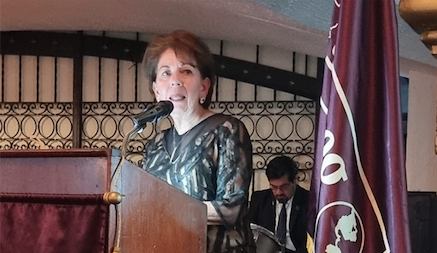Creativity and communication: women change the world
[et_pb_section][et_pb_row][et_pb_column type=»4_4″][et_pb_text]Relaunch of AMMPE ITALIA 2023
“Women change the world” is the title with which the Italian chapter of the World Association of Journalists and Writers AMMPE (from the acronym in Spanish, Asociación Mundial de Mujeres Periodistas y Escritoras, founded in 1969 in Mexico City of which 30 countries are part) wanted to relaunch the activities for the current year.
Opening the work at the Association of Foreign Press, the vice president of AMMPE Italy Alba Kepi, writer and correspondent in Rome for RTV Ora News Albania, after bringing the greetings of the President of Foreign Press, Esma Çakir, presented: “I come from a small country in front of the Italian Adriatic, in the heart of Europe, with a European history but not yet part of the European Union. My Albania has lived for almost half a century a vicious dictatorship and I grew up as a woman, daughter, student, professional, without the existence of an association of women, for women”.
“Por eso acepté la invitación de ser parte de AMMPE Italia como una oportunidad para mí y para otras mujeres: madres, hijas, jóvenes profesionales que, como yo, provienen de países donde las condiciones sociales, económicas, políticas y de otro tipo, han prohibido estas realidades”.
“I chose a word to wish this new year for us women journalists and writers: solidarity,” she added. “Solidarity must unite us in our challenges, in this world where freedom of expression, labour rights, human rights, language and values are not respected and often threatened by the powers of our society. The data, the reports, the studies, the analyses on women in career, women in the family, women who are raped, threatened, denigrated just because they are women, or tragically victims are an important point to analyze the state of health of our society, and to unite more one to the other and to give more value and concreteness to the word solidarity”.
“We also realized that there is no system in which this data, our analyses, our problems, our battles, our collaborative experience together, can come together and create a concrete and active reality that can work as an information agency for women and help disseminate our objectives: creativity and information”, she concluded.
The journalist and writer, President of Ammpe Italia, Patricia Mayorga explained why we talk about the “relaunch” of Ammpe Italia: the registration at the Agenzia delle Entrate of the Italian chapter of Ammpe was made, in 2020 only two weeks before Italy entered the lockdown and although throughout the critical period there were several initiatives, there was never a “launch” formal due, also to the fact that the chapter was engaged in the organization of the XXIV Congress that was held in Rome between 14th and 17th September. She recalled that the 25th Congress will take place at the end of 2024 in Punta Arenas, in Chilean Patagonia, and she invited everyone to participate.
Then she mentioned the difficult period we are going through and the lack of credibility of journalism. In this sense she called for the use of good journalism that in the case of women also passes through “an almost maniacal attention” of gender language, but not only: “that’s why it is essential to continue to use the same tool as always: good journalism”, she said. “That courageous and impartial journalism that each, probably with different shades, has always used, that feminist perspective whose ultimate goal is to provide truthful information, trying by all means to deal with the numerous hoaxes, the stereotypes and threats that plague us for only one fact: being women, being communicators and telling the truth”, she added.
In her speech, the City Councillor, Vice President of the Statutes and Technological Innovation and Urban Planning Committees of Rome Capitale, Antonella Melito, focused on the word “solidarity” and on the importance of language among women that is expressed not only with the ability but also through the way of expressing themselves, of putting themselves, of speaking through words but also through emotion and expressiveness.
She said “that the strength of women is precisely in the choice not to conform to the language of men, either physical or verbal; in our society man is largely what he says, is what he does, and is what he believes he is, the woman instead must always talk about something that has been entrusted or asked”.
“Changing the world: on this women have an extra gear, that starts from not being afraid of the possibility of expressing themselves in a language that is purely feminine, that not only expresses the message we want to reach but also expresses, that possibility of teaming up and that solidarity among women that then leads you to concretize that message”, she added.
She hoped that “what women must be able to do is to invade the field in all areas, because the world belongs to everyone, changing it together, especially with language and with feminine writing”.
The General Secretary of AMMPE Italia, MariaChiara Petrassi focused on the evolution of journalism, from the traditional to the most recent, characterized by social media, fake news and continuous information channels. She specifically mentioned the language, explaining that “say secretary refers to the segretario of the UN and say segretaria, instead, refers to the woman who brings coffee to the head, evidence that in reality there are two cultural societies: one for men and one for women”. She stressed how important it is to learn from the professionalism of historical journalists, hoping for confidence in the new generations.
The report by Daniela Carlà, head of the public administration promoting Noi rete donne (a network of professionals and experts born over 10 years ago to promote Parity Democracy to 360 years. ) focused on the need to strengthen democracy worldwide, to advance women’s rights and participation: “The age when the word democracy was not spoken out is over”, she said, “today in any adjective analysis, so we must work on how to adjective it to make it usable and solid”. Noi rete donne (una red de profesionales y expertas creada hace más de 10 años para promover la democracia igualitaria a 360°) se centró en la necesidad de fortalecer la democracia en todo el mundo, para avanzar en la derechos y participación: “Se acabó la época en que la palabra democracia no se adjetivaba”, dijo, “hoy en cualquier análisis se adjetiva, por lo tanto hay que trabajar en cómo adjetivarla para que sea eficaz y sólida”.
Then, referring to the recent events in Brazil, she stressed that there was talk of fascism, populism, anti-democratic degeneration, but the component of machismo was not highlighted. In the photos received from Brazil, as well as those of the assault on the CGIL a few years ago, women are either not there or are few.
In addition, she focused on the symbolic value of the handover, a symbolic value to be recovered and imbued with content. Finally, she proposed to create an annual observatory on Equal Democracy in the world, “without fear of original analysis, indeed eschewing the re-proposal of the usual ones that do not help to understand the evolution of situations that change quickly”.
Rosa Praticò, Councillor for AMMPE Italia, explained how the world has an individualistic tendency and that our duty is to unhinge this idea, because only by creating a glue between us, for what are our competences, you can fight this negative inclination. She highlighted how women can always be ready on various fronts “as mothers, wives, managing what is the first company, that is the family, without giving up the personal dreams of each”.
Finally, the report by Rebecca Cenzato, a young graduate in management engineering at the Politecnico di Milano and CEO of MUSA, focused on her proposal to manufacture sanitary napkins made from banana fibre for African women: “From previous personal life experiences, we knew about the issue of menstrual poverty and so we decided to focus on this aspect of poverty,” he said.
She, then, recalled the enormous difficulties women face in some areas of the world in being able to lead a normal social and working life in the menstrual period: “Poverty is often associated with hunger, the absence of health services, clean water etc but there is also this aspect that concerns women who cannot, during their menstrual period, be free to leave home, go to school or go to work. We started from the resources available, not used, and therefore cheap, that are currently being thrown away and not exploited,” she adds.
Cenzato and her team have discovered that banana plants are periodically cut at the foot in crops and once the fruits are collected, all this material and the stem of the plant, is left to rot in the fields or burned, in short, nothing is done: “In reality” “We have discovered that from the stems of banana trees we can extract a fiber with which we can then do different things”, she stressed. At this moment the project is focused in Rwanda, “but we had studied the sub-Saharan belt where bananas are produced more, so also Uganda, Tanzania, Zimbabwe”.
The choice of Rwanda is due to past contacts, but “potentially our model is applicable, with the due changes given by the place, in any place where you have available large quantities of banana fiber”.
Finally, the President thanked the rapporteurs, colleagues and friends present and relaunched the idea of creating an international press agency to give space to news about the female universe that do not always (almost never) land in the world press, which is perceived as a necessity no longer procrastinatable.[/et_pb_text][/et_pb_column][/et_pb_row][/et_pb_section]
